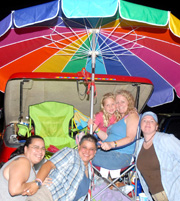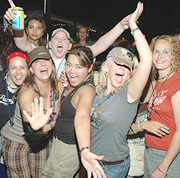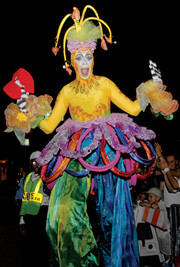Decision: Pride
As Pride Houston considers a vote this month on a possible move of the annual parade, we offer a recap of the controversy over the fate of local Pride festivities along with an update.
 August may prove to be an important month for a controversy that has been churning for months through the local GLBT community. At a meeting on August 25, the board of directors of Pride Houston is scheduled to vote whether to move the Pride parade and festival to a different date and location.
August may prove to be an important month for a controversy that has been churning for months through the local GLBT community. At a meeting on August 25, the board of directors of Pride Houston is scheduled to vote whether to move the Pride parade and festival to a different date and location.
Pride Houston, the nonprofit organization that produces the annual festivities, last year presented the idea of moving the annual parade and festival from its traditional Montrose site to downtown Houston as well as possibly changing the date from late June to September. Pride Houston, through an initial task force it created last year to consider the notions, originally suggested that the proposed changes might take place as early as 2008 (later changed to 2009, according to some Pride Houston sources).
This prospect created much debate with Houston’s gay, lesbian, bisexual, and transgender community and even prompted an opposing editorial in the Houston Chronicle. This dissention derives principally from the belief by many in the community that Montrose is its heart and soul.
 A brief history lesson is in order: Historically, Montrose became the gay epicenter circa the early 1960s, says Ray Hill, the prominent figure in the local and national GLBT community and former member of a second Pride Houston task force, which concluded its work last month.
A brief history lesson is in order: Historically, Montrose became the gay epicenter circa the early 1960s, says Ray Hill, the prominent figure in the local and national GLBT community and former member of a second Pride Houston task force, which concluded its work last month.
“There was nothing about Montrose that made it inherently a place for gays,” says Hill, who is also one of the community’s unofficial historians. Hill explains that gay men started migrating to bars in the Montrose district because they were being poorly treated in the downtown area at the time. Bars like Mary’s…Naturally and Encore opened in Montrose and soon became popular, attracting gay and lesbian people who then wished to reside near their social hangouts.
 But, according to Hill, the era that most impacted Montrose, cementing its reputation as the center of the community, arrived in the early 1980s when the rapid and sudden spread of HIV/AIDS killed a large number of gay men in a short amount of time.
But, according to Hill, the era that most impacted Montrose, cementing its reputation as the center of the community, arrived in the early 1980s when the rapid and sudden spread of HIV/AIDS killed a large number of gay men in a short amount of time.
“There were four to six funerals a week for people I knew,” Hill says. “Everybody had somebody’s ashes in their home.”
Hill adds that these ashes are located all over Montrose—some are even buried in the backyard of Mary’s—eternally uniting the gay community and Montrose.
 “To move Pride week celebration out of Montrose is challenging to all of those ashes scattered over Montrose,” Hill says. “Those ashes give us claim to that truth…it would be as if we were abandoning those memories and that history.”
“To move Pride week celebration out of Montrose is challenging to all of those ashes scattered over Montrose,” Hill says. “Those ashes give us claim to that truth…it would be as if we were abandoning those memories and that history.”
And while Montrose is a significant location for the local GLBT community, Hill also points out the importance of the date of Pride events. June marks the anniversary of the 1969 Stonewall Rebellion in New York City, considered the official beginning of the same-sex equal rights movement.
Hill is not alone in his sentiments for keeping Pride events at their longstanding place and date. At the beginning of 2007, a new community organization called People Opposed to Moving Our Parade Out of Montrose (POMPOM) formed in opposition to Pride Houston’s proposed changes. The group altered its name to People Opposed to Moving Pride Out of Montrose in May.
According to POMPOM chairman John Nechman, a group of local activists created the organization in response to the protests of people in the community who did not want to see the parade moved. (Throughout the controversy, feelings about the festival have remained less intense on both sides of the issue.)
“Every time the issue has been brought up, the reaction from the community has been harsh, it’s been immediate, it’s been passionate,” Nechman says. Describing downtown Houston as “soulless,” Nechman asserts that there are no advantages to moving the parade outside of Montrose.
“No reason could overcome moving this parade out of the heart of the GLBT community,” he says.
Others, who include some Pride Houston volunteers, disagree.
Pride Houston outreach co-chair Rob Camp thinks moving the parade and festival is a good idea for the GLBT community. He says most of the opposition comes from people that he refers to as “old timers” who are resistant to change.
“There’s a fear that if we relocate to a downtown venue that Montrose will no longer be the heart of the community,” Camp said. “Demographically, most of the community lives outside of [Loop] 610 anyway.”
According to Camp, cities that have moved their Pride parades and festivals to downtown venues have been successful (read “Seattle Scene” for a summary of a differing result in that city at www.OutSmartMagazine.com). A larger downtown event will attract more people from surrounding states, thus bringing in more tourism dollars for Houston, Camp says. The assertion about increased local tourism has been a prominent point in the Pride Houston argument for the downtown move.
“As time has gone on, there are more and more reasons for people to be proud,” Camp says. “We think we can grow from that by making it an even better event.”
Camp says that by taking events downtown, Houston will fix many of the problems the parade and festival consistently have faced in Montrose, including lack of public toilets and parking and the presence of crime. Supporters for the change also stress that moving the parade and festival from June to a proposed September date will address the heat problem. Those opposed to the changes, including Hill and Nechman, state that September can be just as hot and humid as June.
Pride Houston originally selected September as a good alternate month, says organization president Carol Wyatt, because of logistics. “I think it might be an easier sale if we were to say we were going to move it to mid October or March,” she says. “Those are beautiful months in our town, but there’s just no room on the city calendar to do that if we move downtown.”
Unfortunately for those who want to move the Pride parade and festival, the majority of the community seems to be siding against any changes.
After the work of the initial task force was met by considerable and vocal skepticism, notably at a public meeting in January, Pride Houston assembled a second 15-member task force to solicit feedback from the community on the proposed changes. The task force consisted of former Pride grand marshals, members of the first task force, individuals connected with POMPOM, and concerned members of the community identified by Pride Houston. Not all members remained involved with the task force throughout its work. Hill was one of the members who resigned before the task force completed its report. “By the end of the process there were five active members who still represented differing points of view,” the task force report to the board indicated.
According to task force member Deb Murphy, the group was asked to determine the community’s stance regarding the location and date of Pride events through an online and in-person vote process. “We were charged with developing pros and cons and getting them out there, then getting a poll of community preferences,” she says. Murphy, who indicates that she represented POMPOM interests on the task force, praises the structure of the task force and the process, which included leadership by an outside facilitator.
The results of the poll, conducted online from June 18 to June 24 through the Pride Houston website and on June 23 by task force volunteers at the festival and parade sites, indicated that an overwhelming majority of people who voted (73.7 percent) want to keep the events in Montrose during the month of June. Only 15.6 percent of voters expressed a wish to move the parade and festival to a downtown location in September. A total of 649 votes were cast in person, and there were 223 online votes, according to the task force report (published at www.pridehouston.org ).
These results stand in stark contrast to those of an online survey conducted last year by Pride Houston in which a majority of respondents indicated a preference for the proposed changes. Some community observers, however, questioned the validity of that survey, claiming a bias for the downtown move in the content of the questions and structure of the survey.
The Pride Houston board of directors retains the decision-making authority when it votes later this month (like many community groups, Pride Houston is a private, nonprofit organization governed by a board that does not directly answer to the community). At press time, reports from the board seemed to indicate a likely “no” vote on any move, at least for 2008, at the August 25 meeting—in part because of the task force report and other community feedback and in part because Pride Houston faces a debt after the 2007 events.
Wyatt says the results determined by the second task force may indeed influence how the Pride Houston board votes. “We’ve always been very interested in the community’s feedback and position on this issue,” she says. “It’s a huge part of what our evaluation process will be.”
Wyatt adds that several factors will contribute to a board decision on where and when future Pride celebrations will be held.
“Part of it is ‘How does the community feel about it’ and part of it is ‘Are we as an organization capable and ready to tackle the challenges that the move will take,’” she says.
“There’s a lot that goes into this.”
Photos by Dalton DeHart (www.daltondehart.com) and Yvonne Feece (www.digiproofs.com, password: Pride2007)
______________________________
SEATTLE SCENE
For two years, controversy has marred Pride celebrations in Seattle ever since Seattle Out and Proud, the Pride organization in that Washington city, decided to move its parade and festival to a downtown location from Capitol Hill, the traditional GLBT neighborhood. In April the Seattle Times reported that Out and Proud was considering a cancellation of events planned for June due to a $102,000 debt incurred after the downtown move, which was met by protests from many in the local GLBT community, including Capitol Hill businesses. In June, Out and Proud did present a parade and festival in downtown Seattle, but a second parade and music festival also took place on Capitol Hill, organized by the Seattle LGBT Community Center.
Marianna Bekker recently moved to Houston from Boise, Idaho, where she graduated with honors from Boise State University. She served as a reporter and arts and entertainment editor for the campus newspaper, The Arbiter. This is her first contribution to OutSmart. Tim Brookover also contributed to this article.










